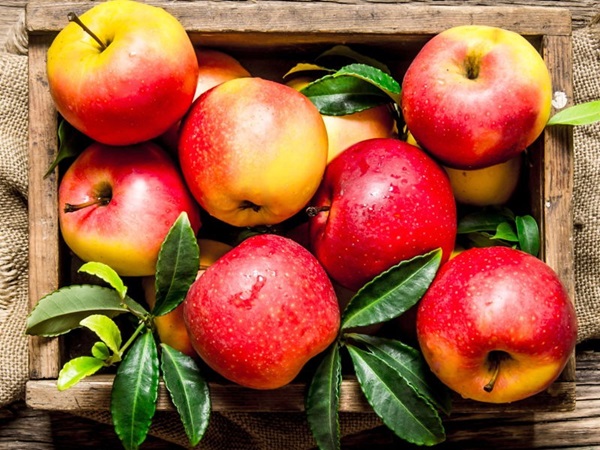National Apple Month takes place in October across the country. It’s a whole month dedicated to celebrating apples, and we are excited about it. From caramel apples and apple picking to Halloween-themed poison apples and apple pies for Thanksgiving, apples are the perfect fruit to enjoy in the middle of fall.
History of National Apple Month
Apples have been around for almost 10000 years. They are a popular fruit to eat and play a significant role in cultural contexts. Apples originally came from the Malus sieversii species in the mountains of Kazakhstan.
The earliest apples were wild and not very tasty, quite different from the delicious modern apples, the Malus domestic, we enjoy today. Through domestication and globalization, apple varieties improved and became more enjoyable. In China, apples have been enjoyed as a dessert for over 2000 years!
As apples traveled along the Silk Route and eventually spread across the world, apple cultivation increased. Emphasizing the fruit’s size, color, firmness, and acidity, grafting became a common technique for optimal breeding.
Initially, farmers used to store the cultivated apples in frostproof cellars. As the apples became the popular and leading fruit in the multibillion-dollar industry, advancements were made in their storage.
During the 1960s, the U.S. introduced the first-ever controlled atmosphere storage facility specifically designed for apples. Apples are one of the important fruits for the food industry and have also played significant roles in various cultural contexts.

However, this has not always been positive. In the 16th century, literary texts began referring to the apple as the forbidden fruit that Adam and Eve ate.
Famous painters of the time depicted Adam and Eve under apple trees, reinforcing this idea. Even Disney contributed to the apple’s bad reputation with the Poisoned Apple in “Snow White and the Seven Dwarfs.”
| 10,000 Years Ago (Apples are Wildin’) | The wild Malus sieversii is discovered. |
| 2,000 Years Ago (Oh, Sweeet) | Civilized soft apples are used as dessert apples in China. |
| 19th Century (Johnny Appleseed Arrives) | John Chapman, aka Johnny Appleseed, introduces apple trees to large parts of the U.S. |
| 1904 (Let the Celebration Begin) | National Apple Week was born and observed across the nation, which later became National Apple Month. |
Five Interesting Facts About Apples
- Apples Are Part of the Rose Family: Apples belong to the Rosaceae family, which also includes pears, plums, cherries, and almonds. This botanical family is known for its beautiful flowers and sweet, edible fruits.
- Historical Significance: Apples have a long history and have been cultivated for thousands of years. They are one of the oldest cultivated fruits, with evidence of apple cultivation dating back to 6500 B.C. in regions of present-day Kazakhstan.
- It beats OJ: Apple juice is one of the most popular breakfast juices in the U.S.
- Nutritional Benefits: Apples are a great source of dietary fiber, vitamins (especially vitamin C), and antioxidants. They are low in calories and have been linked to various health benefits, including improved heart health, reduced risk of diabetes, and better digestive health.
- They don’t sink: Apples are made up of 25% air, which allows them to float on water.
Health Benefits of Apples
Apples are not just delicious but they are also incredibly nutritious. They offer a range of health benefits as they are packed with vitamins, minerals, and fiber.
- Rich in Fiber: Apples are high in dietary fiber, particularly pectin, which aids digestion and helps regulate blood sugar levels.
- Antioxidant Powerhouse: Apples contain antioxidants such as quercetin, which can help protect cells from damage and reduce inflammation.
- Heart Health: Regular apple consumption has been linked to lower risks of heart disease, thanks to its fiber content and beneficial phytonutrients.
- Weight Management: Low in calories and high in water content, apples can help with weight management by promoting a feeling of fullness.
- Bone Health: Certain compounds in apples, like flavonoids and polyphenols, have been associated with improved bone health.
Conclusion
In conclusion, National Apples Month is more than just a celebration of this beloved fruit; it’s a tribute to its rich history, diverse cultural significance, and impressive nutritional benefits. From ancient wild apples to the modern varieties we enjoy today, apples have traveled a long journey, impacting culinary traditions and health practices across the globe.
Whether you are savoring caramel apples, enjoying a slice of apple pie, or simply appreciating the fruits’s role in our diets, National Apple Month provides the perfect opportunity to celebrate the apple’s enduring legacy and its contribution to our well-being. So, this October, embrace the versatility and richness of apples and enjoy the many ways they can be a part of your fall festivities and everyday life.
Frequently Ask Question
What is National Apple Month?
National Apple Month is celebrated in October across the United States. It is a month dedicated to honoring apples and enjoying various apple-related activities, including caramel apples, apple picking, and apple-themed recipes.
How long have apples been around?
Apples have been cultivated for nearly 10,000 years. They originally came from the Malus sieversii species in the mountains of Kazakhstan and have evolved into the modern varieties we enjoy today.
What historical significance do apples have?
Apples have played a significant role in various cultural contexts. They were used as a dessert in China over 2,000 years ago, and their cultivation spread along the Silk Route. Apples have also been depicted in literature and art, such as the biblical reference to the forbidden fruit and Disney’s poisoned apple in “Snow White and the Seven Dwarfs.”
When did National Apple Month originate?
National Apple Month began as National Apple Week in 1904 and later evolved into a month-long celebration in October.
You may also like to read, National Chocolate Milk Day – September 27, 2024
